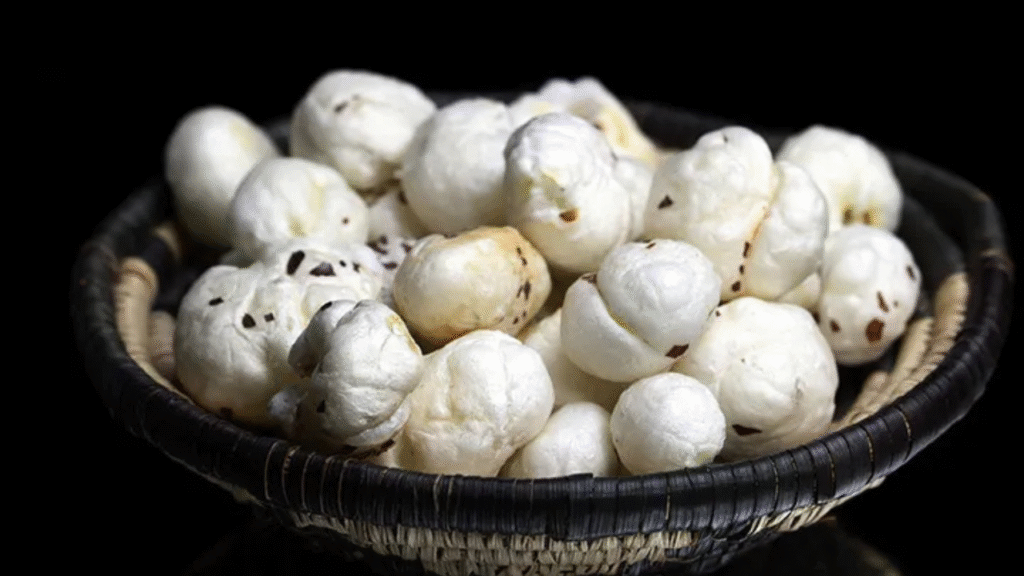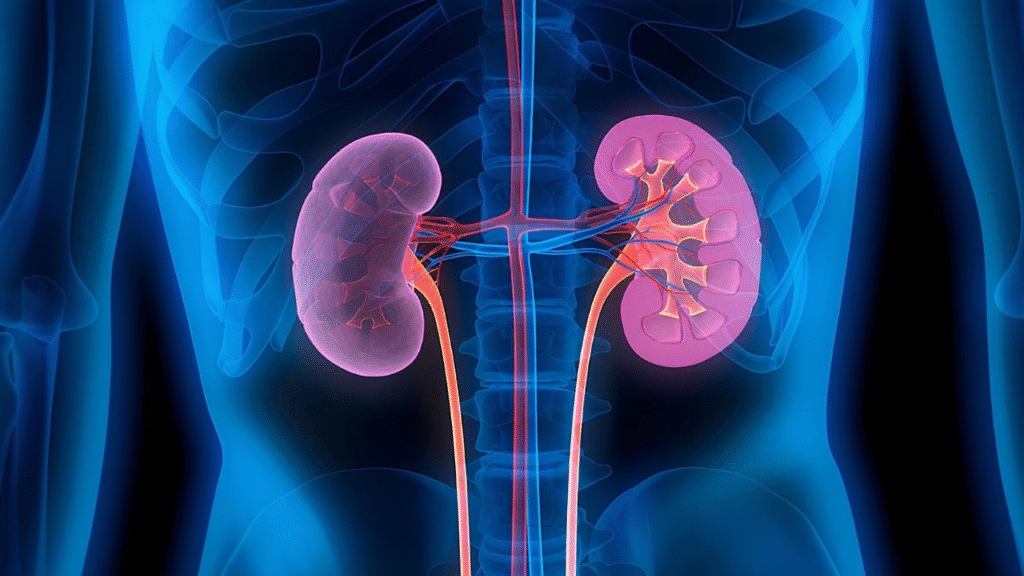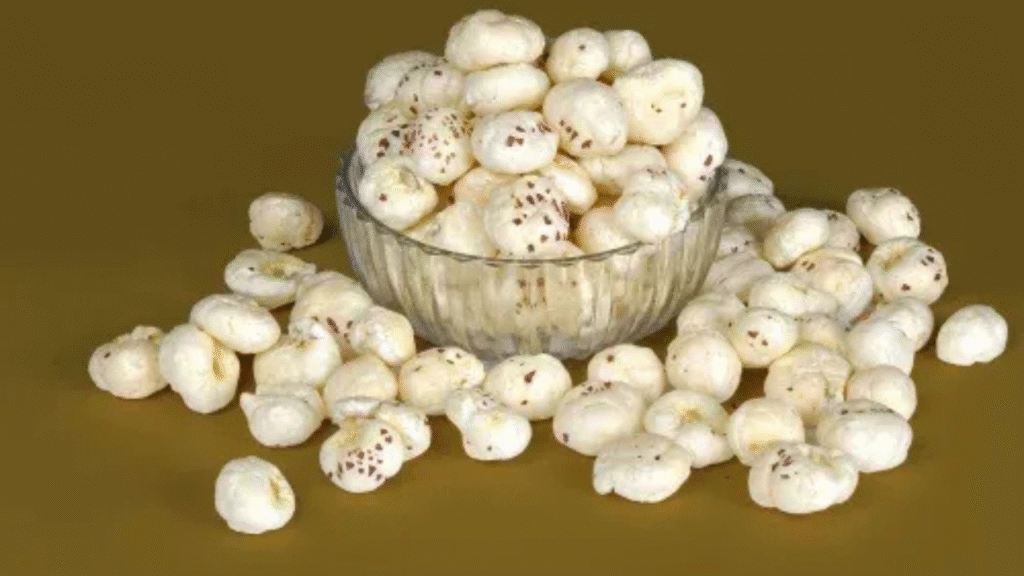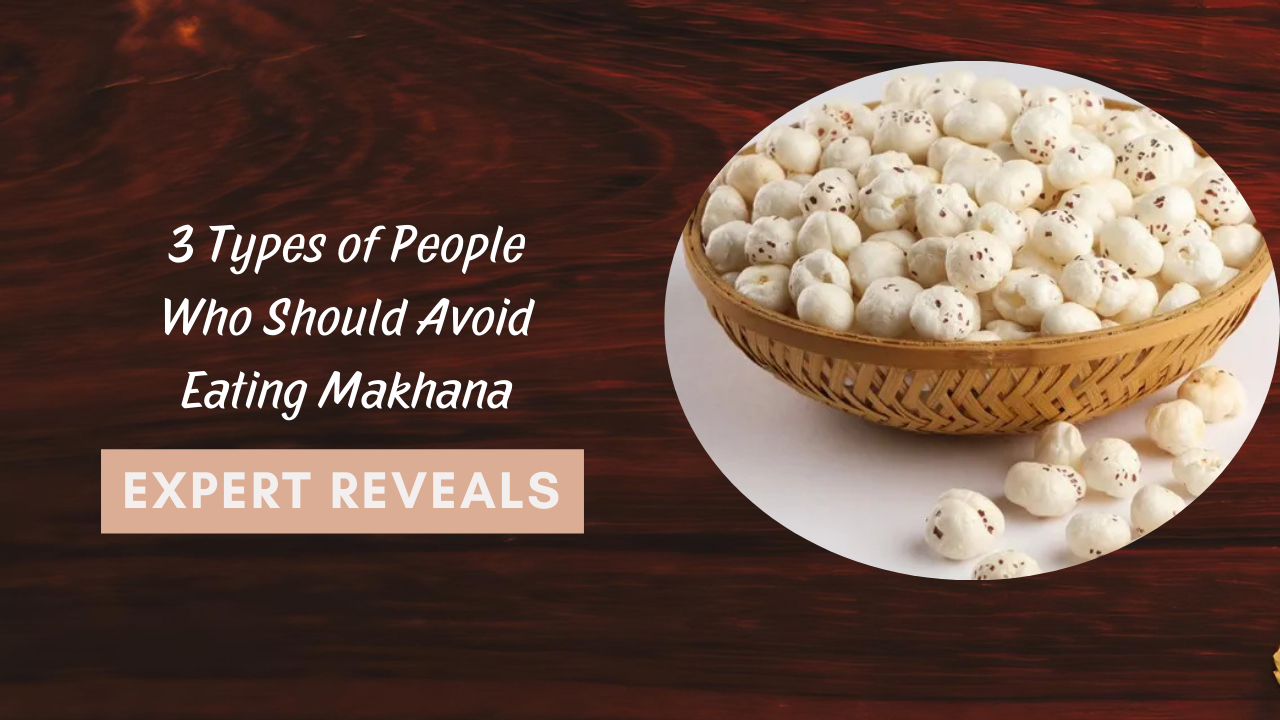Makhana, or fox nuts or lotus seeds, has taken off as the superfood in recent years. Roasted for pegged crunchy therapy, used in curries, and desserts, it’s rendered light, nutritious, and low-calorie points, garnering a hell of a lot of praise. Not only that, but makhana is also long known as a rich protein, magnesium, iron, and antioxidant-rich food that has been part of the Ayurvedic diet and fasting traditions for a long time throughout India.
As it is evident, a lot of health fanatics add makhana to their daily diet because it cures weight loss, heart functioning, and simply improves digestion; even then, experts say it is not for everyone. Makhana, like any other food, has its particular limitations, and excessive use or inappropriate usage can do more harm than good.
According to nutrition experts, there are three specific categories of individuals who must refrain from consuming or reduce their intake of makhana. Let us, however, explore its nutritional profile, benefits, and why it may not be considered good for some individuals.
Nutritional Profile of Makhana
Before understanding the risks, what makes makhana considered healthy has to be understood.
Per 100 grams of roasted makhana contains approximately:

- Calories: 350
- Protein: 9-10 g
- Carbohydrates: 65-70 g
- Fiber: 7-8 g
- Fat: 0.1-0.5 g
- Magnesium: 150-180 mg
- Iron: 2-3 mg
- Calcium: 50-60 mg
- Potassium: 500-600 mg
Makhana is really low in fat and gluten-free, while it contains loads of antioxidants such as kaempferol that combat inflammation and even age. Therefore, it becomes an attractive snack among those weight-watchers and health-conscious people.
Health Benefits of Makhana
Many benefits are derived when consumed in controlled quantities:
- Weight management: Low in calories, keeps you fuller longer.
- Heart health: High magnesium content aids in regulating blood pressure.
- Anti-aging: Abundant in antioxidants that protect against cell damage.
- Diabetes support: Its low glycemic index makes it a better option for snacking.
- Renal health: Traditionally, it’s been used in Ayurveda to fortify the kidneys.
- Bone strength: Supports bone and teeth health through calcium content.
So many benefits would lead anyone to think makhana is, in fact, safe for all. Not so, however, warn experts: there are certain categories of individuals who should limit or not be consuming it at all.
3 Types of People Who Should Avoid Makhana
1. Patients with Kidney Issues (Especially the Stones)
Makhana possesses natural oxalates and potassium, which may work against anyone with kidney disease.

Reasons for Avoiding:
- High potassium levels can worsen kidney diseases by putting additional load on already stressed kidneys in their efforts to filter minerals.
- The presence of some oxalates in makhana greatly increases the chances of developing kidney stones.
- Great overconsumption may lead to mineral excretion imbalances.
Expert Advice:
Kidney patients are mostly advised to follow low-potassium diets, and consumption of maakhna regularly interferes with treatment plans. Always consult a nephrologist before including it in your diet.
2. People with High Sugar Content in Their Blood
Makhana is recommended for consumption by diabetics since it has a low glycemic index; however, this should always be moderated.
Reasons for Excess Avoidance:
- Eating a large quantity of roasted or flavored makhana has been known to increase sugar levels in the blood.
- Most packaged makhana snacks are coated with salt, sugar, or poor-quality oils; thus, they are not appropriate for diabetics.
- Excessive carbohydrates in makhana may still raise glucose levels if portion control is ignored.

Expert Advice:
It is best if diabetic persons eat makhana in very minimal amounts and preferably in plain roasted form no additives. It can also be combined with protein-rich foods to level the blood sugar response.
3. Problems of Digestion (Constipation or Bloating)
Even if filled with fiber, makhana can be heavy on the stomach for some people.
Reason for Avoiding:
- Excessive intake will slow down the digestion process and lead to constipation.
- Some people may bloat or have gas after eating makhana, especially if consumed in fried or flavored forms.
- High fiber without enough water can cause digestive discomfort.
And lastly, individuals with nut and seed allergies or sensitivities may not want to consume makhana as it can produce allergic reactions in sensitive people. Raj also explained that these allergic cases can be as trivial as itching or hives, to severe consequences, including anaphylaxis. Therefore, such people should be careful about their health status before consuming makhana.
Expert Opinion:

If one has a sensitive digestive system, makhana should be incorporated slowly into one’s diet while bearing in mind the response of the body. Consume plenty of water with it or mix it with light foods to reduce discomfort.
Excessive Consumption Side Effects from Makhana
- Overeating may also cause adverse effects for all those who do not belong to the above groups:
- Allergy: Quite rare, however, possibly in hypersensitive cases.
- A presence of sodium: Flavored variety has a tendency to be salty, thus increasing the risk for hypertension.
- Weight gain: With low caloric content, excessive consumption of makhana fried or roasted in ghee may add unwanted fat and calories.
- Mineral imbalance might occur due to excessive magnesium or potassium affecting the functioning of the heart and kidneys.
How To Safely Consume Makhanas
In terms of health, some tips that experts recommend include:
- Having about 30 to 40 grams (about a small bowl) of plain roasted makhana daily.
- Avoid makhanas that are highly processed or flavored with excessive salt, sugar, or artificial seasoning.
- Make a balanced snack by combining makhana with nuts, seeds, or yogurt.
- Make sure to drink water when having fiber-rich snacks, as it helps in digestion.

Who Can Safely Eat Makhana?
For most healthy individuals, makhana constitutes a safe snack for their system. Moderation is always the key. However, the following groups seem to benefit from the consumption of makhana:
- The weight-watchers are in the hunt for low-calorie snacking.
- Children who need a healthy substitute for chips and sweets.
- An elderly person looking for light and easy-to-digest food.
- People undergoing fasting diets require these properties for satiety and energy.
Expert Opinion: Key to Any One Thing Is Moderation
Nutritionists know that even healthy food can be harmful if not consumed properly. Makhana should not be treated as a food free to abuse, but fit for use in a balanced diet with a plethora of other nutrient-rich foods.
Conclusions
Makhana, the humble lotus seed, has found its way into global books as a superfood, and very rightly so. These seeds are nutritious and multipurpose, having a range of health benefits including weight management and heart protection. However, experts warn that consumption of makhana should be curtailed by individuals exhibiting kidney problems or uncontrolled diabetes, or sensitivity toward digestion.
The motto here is moderation. For the healthy individual, one small bowl of roasted makhana is safe and good only a few times a week. However, in case of any reservation on health grounds, it is better to consult a doctor or dietitian before making roasted makhana a staple.
Keep in mind that no one food can alone determine your health; rather, a balanced portion-controlled diet with awareness about what you eat is the key. In this, makhana can play a role, but sensibly only.
FAQs:
Who should avoid eating makhana?
People with kidney issues, constipation, or diabetes should avoid excessive makhana due to its high nutrient concentration.
Can kidney patients safely eat makhana?
No, kidney patients should avoid makhana because it is high in potassium and phosphorus may worsen kidney-related complications.
Is makhana safe for diabetics?
Diabetics must limit makhana intake since overconsumption can spike blood sugar levels and hinder glucose control.
Does makhana cause constipation?
Yes, eating makhana in excess may cause constipation due to its low fiber content and astringent properties.
Can healthy people eat makhana daily?
Yes, healthy individuals can eat moderate amounts of makhana daily as part of a balanced, nutrient-rich diet.
Hi, I’m veda, a professional health content writer and passionate wellness advocate at HealthTipsIndia.com
. With years of experience in writing evidence-based, reader-friendly articles, I specialize in creating content that empowers people to live healthier, more balanced lives. Whether it’s nutrition, fitness, natural remedies, or preventive healthcare, I translate complex medical concepts into actionable tips tailored for the Indian lifestyle. My goal? To make trustworthy health information accessible to everyone—one article at a time.

